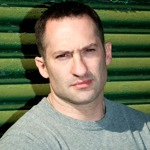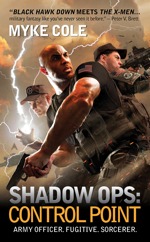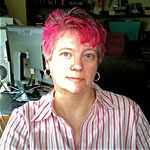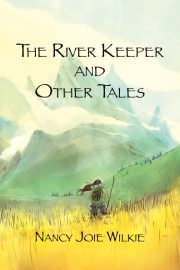An Interview with Myke Cole
by Cat Rambo
 As a security contractor, government civilian, and military officer, Myke Cole’s career has run the gamut from Counterterrorism to Cyber Warfare to Federal Law Enforcement. He’s done three tours in Iraq and was recalled to serve during the Deepwater Horizon oil spill.
As a security contractor, government civilian, and military officer, Myke Cole’s career has run the gamut from Counterterrorism to Cyber Warfare to Federal Law Enforcement. He’s done three tours in Iraq and was recalled to serve during the Deepwater Horizon oil spill.
His first novel, Control Point, is contemporary military fantasy with an engaging edge, delivering satisfying and fast-paced action. For more information about Myke, visit his find his website.
This interview takes place in the giddy whirl of the first week in which your book, Control Point, has come out. Have there been some shining moments that you know you’ll particularly treasure later on?
Roughly 3 years ago, my best friend and mentor, Peter V. Brett exploded onto the fantasy scene with his breakout novel The Warded Man. The book was a deserved runaway success, and watching him soar lit a fire in my belly to get my own writing career moving. I struggled hard to get my work into professional shape, and Pete was tireless in helping me focus on my craft.
Most importantly, he helped me still my tendency to rush, to pay attention to detail and to put quality first and foremost. That, combined with over a decade of my life spent developing my voice and building connections finally punched through.
And after all that time, I walked into a Barnes & Noble with Pete at my side, took my books off the NEW RELEASES shelf and brought them up to the front desk to sign. Pete grabbed his as well and joined me.
Colleagues at last.
Control Point has come out to plenty of notice, and you’ve been indefatigable about guest blog posts, podcast appearances, interviews, etc. How consciously did you shape your book promotion plan and is there one thing you think is crucial to it?
I didn’t shape it consciously at all, other than to target specific large venues (New York Comic Con, Publisher’s Weekly, Pat’s Fantasy Hotlist, the Onion A.V. Club, etc . . . ) that I really wanted to be in. In another Q&A, I was asked this same question, and I laid out my basic rules for promotion:
1. I quit my day job to give myself the time necessary to really go after this.
2. I said yes to EVERYTHING. Every request for interview, guest post, podcast appearance, convention programming slot. EVERYTHING. YES. I WILL DO IT.
3. I accepted the fact that ALL of this is on my dime. I spent freely on it.
4. For those sites/shows/cons that didn’t invite me, I went to them and asked (nicely) if they would have me on. If it was a big venue that didn’t know me, I sent my publicist or agent after them.
At least right now, it’s taking up a TON of my time, and I’m not writing much. Just today I finally got back to working on book III in the Shadow Ops series after being pretty much full time on pumping the book.
The really hard part is that I have absolutely no way to know if it’s effective or not. Control Point‘s amazon.com sales ranking is off to a good start, but that’s no guarantee it won’t start to slide as the novelty wears off. I’ve gained a lot of Twitter followers and Facebook friends, but whose to say whether they’re buying the book or not? I have no way to know if they’re recommending it to friends (which is the way the majority of book sales happen).
And how do I judge how many Twitter followers is a lot? By comparing myself to Neil Gaiman? To Snooki? To the White House Twitter Feed? How can I judge how many @ mentions counts as “buzz?” There is really no hard data correlating guest posts, convention appearances or social media buzz to sales of the book. I intend to keep doing it because I believe it helps, but I can’t say how much it helps and that makes it pretty much impossible to plan around.
 The book’s most engaging moments are the ones where you combine precise military detail with a fantasy overlay. While serving in the military, did you consciously track such details to use in your writing later (and if so, how), or is it simply that you know the setting so well that you can draw on it while writing your first draft?
The book’s most engaging moments are the ones where you combine precise military detail with a fantasy overlay. While serving in the military, did you consciously track such details to use in your writing later (and if so, how), or is it simply that you know the setting so well that you can draw on it while writing your first draft?
The latter. I have worked in/around the military since I got serious about writing (roughly 15 years ago). Add to that my love of military history and military science (I’ve published a bit on 4th-5th Generation Warfare Theory. I won’t bore you with what that is, but you can find a bibliography on my website under the PRODUCTS tab) and my passion for wargaming, and you’ve got a . . . military-geek, I guess.
It also helps that the book was edited, sent out to market right on the heels of my 3rd tour in Iraq (ensuring that I was up to speed on the latest terms, technology and tactics). I still serve in the reserve, which keeps me current as well. Writing in a “military voice” comes quite naturally to me.
Keeping my nerd voice current takes work too. Fortunately, I still read a ton of fantasy and comic books, game when I can, and spend hour upon hour debating finer points of nerd canon (who would win in a fight? Batman or Captain America) at con parties. Blend the two and the Shadow Ops series start to seem kind of inevitable.
Your protagonist, Oscar Britton, starts the book rebelling against his situation and what we might call the military-industrial-complex. You’re a military officer who’s served three tours in Iraq. Was Oscar — and the other characters for that matter, such as Fitzsimmons, Harlequin, and Salamander — a way to explore some of your own conflicts about the military?
Of course. The military is obsessed with internal scrutiny. The degree of self-policing (and corresponding punishment) far exceeds any private sector organization. This is particularly true of officers, who are ultimately responsible for the actions of their subordinates. Now, this is out of necessity. The military wields deadly force and much of the nation’s wealth and it is expected to be accountable for how it handles both.
That kind of pressure trickles downhill (as it should), and suffuses the entire organization with a culture I can only describe as “internal-affairs heavy.” I wouldn’t want it to be any other way, but when you combine that kind of pressure/responsibility with the license granted by the immediate need for action in a crisis and you get a unique environment where the Fitzys, Harlequins, Salamanders and yes, Oscar Brittons of the world can both be born and can live and operate.
I absolutely love the military, but I’m not blind to the challenges and limitations of the life either. Control Point was definitely a steam valve in some respects.
The chapters are interspersed with documents that help shed light, often quite entertainingly, on the setting. What gave you the idea and how much fun was it to write those? Were there any that didn’t make it into the final version?
The publisher is calling those “epigraphs.” The idea came to me fully formed while exercising (I get a lot of my writing ideas this way). It turned out to be a fabulous tool for giving information to the reader without expository dialogue or infodumps (something all SF/F writers struggle with. You have to build a unique world without overloading the reader with important details in a way that slows the narrative).
Inspirational quotes are a big part of military culture and are a blast to write. There are a TON of great ones in the Warhammer 40,000 universe (you can see a sampling here). Warhammer 40,000 began as a table-top miniatures game before it spun off a publisher to cover fiction in the universe, so it had the challenge of relating the entire story to the reader through just imagery, game rules and epigraphs. The idea really stuck with me and made writing Control Point much more fun.
There are plenty of epigraphs that got cut, and many of those were repurposed to Fortress Frontier. I’m currently collating/refining notes for Breach Zone (book 3) and part of that involves planning the new epigraphs. Can’t wait to see what comes up.
What writers do you think are the strongest influences on your writing? Are there any whose universes you’d like to write in?
The single strongest influence on my writing is Peter V. Brett (author of the Demon Cycle, which currently consists of The Warded Man and The Desert Spear). He is a dear friend and mentor, but even if we had no relationship, I would still be in awe of his narrative efficiency, his empathy for his own diverse range of characters and his unflagging commitment to perfection in his work.
China Mieville is a huge influence in his willingness to break rules and push boundaries in genre, and Joe Abercrombie has really impressed the importance of extrapolating realism in fantasy writing. And those are just three.
I read a great deal and have many other significant influences, but we don’t have the time for me to go into all of them here. But I wouldn’t want to write in their universes. Writers become influences on me because I am awestruck by their work. The first thing I usually feel when I encounter such a writer is a desire to throw in the towel (because I could never write so well). Once I get over that, and begin to study their craft, I am still left with the indelible impression that I could never do it as well as they could.
And, honestly, why would I want to? It’s their voice that I enjoy. I know what my own sounds like.
That said, there are soooo many media tie-in franchises I’d love to write for. I’m a big fan of Star Wars, Warhammer and Warhammer 40,000, Starcraft, D&D, and about a million different comic books. Those franchises already have a range of voices contributing to them (some great, like Joe Schrieber and R.A. Salvatore – you asked about my influences). If I could add my voice to the mix, that would be amazing.
Several recent interviews have touched on your plans to write a romance someday. Any other genres that seem particularly worth tackling? Any that you would never touch?
I try to think of myself as a writer in the broadest sense. My complete list of publications isn’t on my website, but it includes non-fiction on military theory, satire, journalism and military public affairs writing. I’ve written and published both fantasy and science fiction, but have also written (unpublished) historical fiction, literary fiction and even a western. SF/F is my first love, but I can honestly say there isn’t anything I wouldn’t want to write.
What’s your favorite place/situation for writing in?
The Rose Reading Room at the New York Public Library or a local coffee shop. People around, giant cup of coffee next to my laptop, decent (free) wifi connection. Movie soundtracks on my headphones drowning out ambient noise. Cheap eats and hopefully the guy sitting next to me has a nice dog who I can sneak bits of my sandwich to.
What’s your favorite RPG system? Alignment? Polyhedral? Any plans to do some game writing? What about a Control Point game?
System: D&D 1st Edition. Not the red-box; the old hardcover Players Handbook, Dungeon Master’s Guide and Monster Manual.
Alignment: Lawful Good.
Polyhedral: The classic 20-sider. Preferably red with gold numbers (or black with red numbers).
Plans to do game writing: From your lips to god’s ears. I’d love to. Control Point game: Game design and writing fiction for a game universe are two very different things. I feel very confident in my ability to do the former and have absolutely no ability in the later. I’ve recently become friendly with Joshua A.C. Newman, and have learned a ton about what goes into making compelling games from him. It’s a lot more complicated than people think (and I’m talking about the game mechanics here, not the story).
My point in all this? If somebody wants to make a Control Point game, I would be overjoyed and would help the project in any way I could. But I can’t design the skeleton of it.
Where can Control Point fans find more of your work, and when can they expect the sequel?
You can check out my bibliography. Fortress Frontier (Book 2 in the Shadow Ops series) is already done, approved by my agent and turned into the publisher. You can expect it January 31st of 2013. Breach Zone will follow a year later.
What question should I have asked you that I didn’t?
You should have asked me what folks can do who want to join the military but don’t want to give up their full time jobs.
What about folks who want to serve their country, but not in a service that is dedicated exclusively to warfighting? Well, we’ve got an app for that – http://www.gocoastguard.com/find-your-career/reserve-opportunities. And for those folks who want to help but are too old or have physical limitations? We’ve got an app for that too – http://join.cgaux.org/
Stand with me. I can’t do this alone.
 Find Cat Rambo’s fiction, which includes over a hundred published stories, at her website. She teaches at Bellevue College as well as via online workshops and serves as a volunteer with Clarion West. Her most recent publication is her short story collection for Kindle and other e-readers. She is the editor GoH at MidSouthCon this March.
Find Cat Rambo’s fiction, which includes over a hundred published stories, at her website. She teaches at Bellevue College as well as via online workshops and serves as a volunteer with Clarion West. Her most recent publication is her short story collection for Kindle and other e-readers. She is the editor GoH at MidSouthCon this March.

